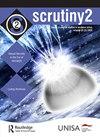作为非殖民化纽带的多元文学学习环境——南非大学文学课程的非殖民化教学设计
IF 0.1
0 LITERATURE
Scrutiny2-Issues in English Studies in Southern Africa
Pub Date : 2020-01-02
DOI:10.1080/18125441.2020.1800806
引用次数: 0
摘要
在南非的高等教育机构中,从事语言和学术素养领域工作的教育工作者需要对学生群体的语言和文化多样性保持敏感和敏感,而传统的教学方法往往不适合满足学生的需求,也不适合满足高等教育非殖民化的更广泛呼吁。作为一群在南非约翰内斯堡的威特沃特斯兰德大学教育学院工作的讲师,我们致力于通过设计一门以非殖民化和社会实践方法为基础的扫盲课程来应对这种情况。本文以批判性反思为研究方法,追溯了我们设计这门课程的理论基础,包括新文学研究(NLS)、社区文化财富和土着研究的理论,如文化界面理论。本文进一步展示了我们如何通过引入实践活动来应用这一理论框架,这些实践活动可用于培养情境素养,并利用学生带到课堂上的社区文化财富。我们讨论了课程核心的四个形成性和总结性评估要素,即在线评估、作品集任务、议论文和我们称之为三元项目,以说明非殖民化方法如何影响我们的课程设计和教学方法。我们的方法使我们能够探索新的评估形式,为学生的母语、读写能力实践和身份认同开辟了空间,使其成为教学和学习的宝贵元素。本文章由计算机程序翻译,如有差异,请以英文原文为准。
The Multiliteracies Learning Environment as Decolonial Nexus: Designing for Decolonial Teaching in a Literacies Course at a South African University
Abstract In higher education institutions in South Africa, educators working in the fields of language and academic literacy need to be sensitive and responsive to the linguistic and cultural diversity of the student body, and traditional pedagogical approaches are often inappropriate to meet the needs of students and of the wider call to decolonise higher education. As a group of lecturers working at the University of the Witwatersrand’s School of Education in Johannesburg, South Africa, we worked to respond to this context by designing a literacies course that was underpinned by a decolonial and social practices approach to literacy. Using critical reflection as a research method, this article traces our theoretical grounding in designing this course, including New Literacies Studies (NLS), community cultural wealth, and theories in indigenous studies, such as cultural interface theory. This article further demonstrates how we applied this theoretical framework through introducing practical activities that could be used to develop situated literacies and that tapped into the community cultural wealth that students bring to the classroom. We discuss four formative and summative assessment elements that were central to the course, namely online assessments, portfolio tasks, an argumentative essay, and what we termed the triad project, to illustrate how the decolonial approach informed our curriculum design and pedagogy. Our approach allowed us to explore new forms of assessment which opened space for students’ home languages, literacy practices, and identities to become valuable elements of teaching and learning.
求助全文
通过发布文献求助,成功后即可免费获取论文全文。
去求助
来源期刊
CiteScore
0.50
自引率
0.00%
发文量
10
期刊介绍:
scrutiny2 is a double blind peer-reviewed journal that publishes original manuscripts on theoretical and practical concerns in English literary studies in southern Africa, particularly tertiary education. Uniquely southern African approaches to southern African concerns are sought, although manuscripts of a more general nature will be considered. The journal is aimed at an audience of specialists in English literary studies. While the dominant form of manuscripts published will be the scholarly article, the journal will also publish poetry, as well as other forms of writing such as the essay, review essay, conference report and polemical position piece. This journal is accredited with the South African Department of Higher Education and Training.

 求助内容:
求助内容: 应助结果提醒方式:
应助结果提醒方式:


